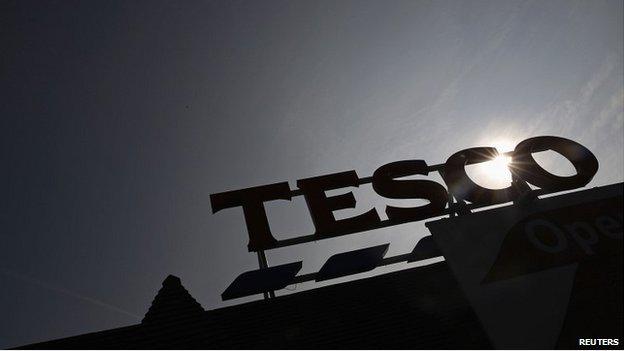Tesco was warned in 2010 about 'aggressive accounting'
- Published
- comments

Talking to Tesco's most significant investors, it is becoming clear that the people who own Britain's biggest retailer will not be happy until the company fundamentally reassesses the way it operates.
They do not want Dave Lewis, the new chief executive, or Sir Richard Broadbent, the under-pressure chairman, to confine their investigation to the £250m profits overstatement - serious as that is.
They want root and branch change, and for some at least that change would culminate in the departure of Sir Richard himself.
I first revealed investor disquiet two days ago - “Tesco investors put Sir Richard in the frame”.
Investors say that Tesco has had multiple warnings. One has just told me about an analyst report dated June 2010 from the American banking giant, Citi.
It said that "Tesco's accounting is consistently aggressive", and that if it had more "standard" accounting methods its profit before tax would fall by £64m.
To be clear, the Citi note said that it was not implying that "Tesco's accounting policies are in any way incorrect".
It is just that they are applied in a way that is often in Tesco's favour. Even within the business, Tesco sources have admitted that its slogan "Every Little Helps" often appeared to mean "Every Little Helps Tesco".
"Look at this company on more comparable accounting assumptions and it does not look good value," the Citi analysis from four years ago said.
"Tesco has a more aggressive policy than its peers with regard to revenue recognition, depreciation, property-profit allocation.
"We suggest that the cumulative impact of the increasingly strident policies they have adopted render the P&L [profit and loss] bottom line significantly different from what a peer company might report."
Sound familiar?
'Still profitable'
In the 2010 note, Citi cuts its target share price to 350 pence. Tesco, of course, would kill for that number now. Shares are presently trading at 193p and are drifting down again after a short pause on Wednesday.
The question could quite reasonably be asked: "Why didn't investors make more noise about this before?"
The more cynical might suggest that they were too busy reaping the returns from a business that was hugely profitable and offered a generous dividend.
Tesco is still profitable. It is still the market leader in the UK by some margin (its closest competitor, Asda, has a share of the market well below 20%, compared to Tesco's 28%).
Investors I have spoken to say that they have made it clear for a long period that the internal culture at Tesco had to change. Some say that Sir Richard was too slow to act.
They want him to use the present mess to reset the business. He might, indeed, consider the words of the former White House chief of staff, Rahm Emanuel.
"You never want a serious crisis to go to waste."